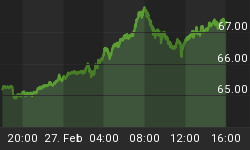This "etude" has nothing to do with today's economic or market events. Rather, it is a little "acorn" for you to bury today and dig up in the future when some partial-equilibrium yahoo on CNBC says that total spending in the economy will get a boost as households refinance their mortgages at lower interest rates. Yes, the folks doing the refinancing will now have more income left over after making their monthly mortgage payment to spend on other things. But what about the ultimate lender who has had his higher-interest security "called" away from her? She was earning 6% on her loan but now is able to earn only 4% on the same type of loan. All else the same, has not her income gone down by the same amount as the refinancer's after-interest disposable income gone up? Yes. Thus, while the refinancer is able to go out to dinner more, the refinancee will be dining out less. You do not have to fall into the trap of partial-equilibrium analysis. Do as Bastiat suggests. Take into account the effects of not only what is seen, but those effects that must be foreseen.
How Do Higher Gasoline Prices Reduce Real GDP Growth?
Another "acorn." We often hear that higher gasoline prices will reduce real GDP growth. Why? When I spend more at the pump, the producers of gasoline receive higher revenues. What do they do with these revenues? I would argue that the gasoline producers spend them in one way or another. They may spend the revenues by hiring more geologists in order to find more crude oil. They may increase their dividend to their stockholders. They may repurchase some of their stock in the open market. Thus, so far, what is seen is a redistribution of total income in the economy, not a decline in total income. But what must be foreseen is what a deficiency of gasoline implies for the total production of goods and services in the economy. Just as labor is required to produce goods and services, so too, is energy. If there is a reduction in the supply of crude oil, and hence, gasoline, then not only will the price of these energy products rise, but the reduced supply of these products will imply a reduced ability to produce all manner of goods and services in the economy. Think of a reduction in the supply of crude oil as something akin to a pandemic. If a pandemic were to result in a reduction in the labor force, then not only would wage rates rise, but total output in the economy would fall because of a reduction in the number of people on assembly lines and in offices. Thus, the negative impact on real GDP growth from an increase in crude oil/gasoline prices results from aggregate supply-side effects, not aggregate demand-side effects.
But what if gasoline prices are rising, not because the supply of gasoline is falling, but because the demand for gasoline is rising? What would be the impact on real GDP growth in this case? It's all relative. That is, the demand for gasoline is rising faster than the supply of gasoline. There is a relative deficiency of gasoline. This implies that the growth in real GDP will slow relative to what it would have been had increases in the supply of gasoline kept up with increases in the demand for gasoline.
Paul L. Kasriel, post April 30, econtrarian@gmail.com















